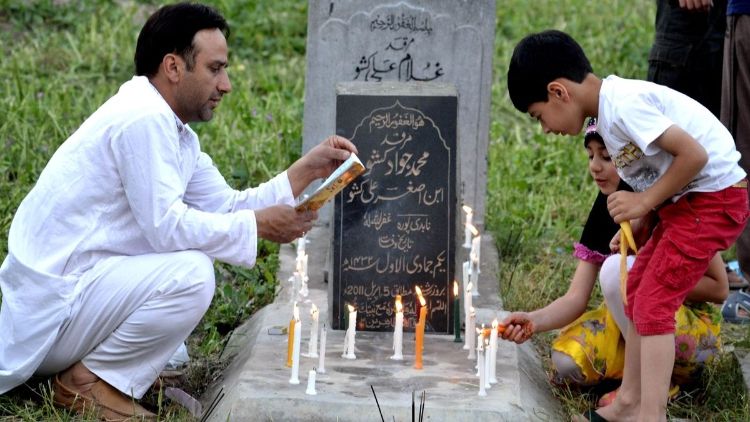
Purvanand
Moving from Delhi's ITO towards Delhi Gate, the darkness of night appeared to be fading away with the shimmer of electric illuminations on both sides of the road. It hit me and Approva almost simultaneously: 'Hey, it’s Shabe Barat'. The morning newspaper has carried an advertisement in which the Lieutenant Governor of Delhi had spoken about the arrangement for Shabe Barat.
The message was a warning: it said on this occasion, young men do daredevil manoeuvres on motorcycles on the roads that at times cause accidents. He had asked the elders of Muslim society to control the youth.
Apart from this advertisement, there was nothing in the newspaper about the Shab procession. It made me think that all that a reader will remember of this Muslim festival is the one related to crime and road accidents. I surmise that Hindi newspapers in Bihar and Uttar Pradesh had written about this festival, but generally, there is ignorance about it among the Hindus.
For people like me who grew up in the old ways, the memory of the Shabe procession is associated with fireworks, lights and halwa. Purva had mentioned halwa to my student Rizwana. She told her that on this day only semolina halwa (suji ka halwa) is prepared at her home.
I was disappointed to hear it. Purva fretted over the apparent decline in the culinary standards of Muslims of Delhi. Our memory is about picking the diamond-shaped pieces of halwa. However, the suji ka halwa was at the bottom of the delicious halwa made on this day. The most favourites and top-ranking were the halwa made from gram flour, gram, lentils and egg.
Green gram pudding was another speciality of this day. Coming from Siwan to Patna, I visited the family of Wasi Saheb where after eating the halwa made by Meher aunty, I never even pretended to act modestly while helping myself to more of it. The sweets purchased from the market were there just for display; nobody would look at these at the cost of ignoring the zarda and halwa!
On Barkeid, one misses my share in the meat of the lamb that is ceremonially sacrificed on that day. There is no way I can claim my share of mutton on visiting home after two years but I can always demand the special halwa.
In my childhood, I was surprised to see people visiting the cemetery at night. Later, it came to know that this is a festival to remember those who have passed away. According to the moon, on the last night of the fifteenth day of the eighth month of the Islamic calendar called Shaban - falls Shabe Barat. Interestingly, this name is prevalent only in India, Pakistan, Afghanistan, Bangladesh and Iran.
The Arab world knows it as Lailatun Nisfe bin Shaban or Lailatul Barah. This is the night of accounting, of salvation, of forgiveness. The devotees call Allah, also called Khuda and offer prayers. It is believed that Allah descends on the nearest sky at the time of sunrise and says, 'Is there no one to apologise whom I can forgive? Is there is no injury or unhappiness that I can give relief from?
’This announcement continues till Fajr (morning) namaz. The Shabe procession is a festival of remembering your ancestors and taking pledges for the life ahead; it’s about the light. However, is the light of this night only meant for Muslims? Can’t the non-Muslims participate in this festival of joy and hope?
On this night, I remember Sheikh Mohalla, Hashim Saheb, Faiz Saheb of Siwan. I affectionately called Faiz Saheb Fach Chacha. I also remember Mian Farooq and Meher auntie of Patna. Shabe procession is an Indian festival; it has a name different from what Arabs call it, so we all should participate in it.
However, it would be wrong to reduce either the Muslim-ness or the Indianness of this festival. Non-Muslims must ask themselves do they know enough about Shabe procession. Does a Hindu know as much about the festivals of Muslims as they or others know of the dominant religious community of the land? Do they even feel the need to know?
The Hindus have a little link with the culture of a large part of India where Muslims, Christians, Adivasis, Parsis, Sikhs live. Once upon a time, Hindi writer-poet Muhammad Sahib could make Hazrat Ali as a character of his poem. Today it is difficult. Whether it is Holi or Diwali, Krishna Janmashtami or Ramnavami, the works of Nazir or Iqbal come up on Facebook on such occasions. Can one expect reciprocation from Hindu writers for occasions like Shabe Baaraat or Eid or Muharram?
Hindus often call all their religious festivals cultural manifestations and accept them as Indian. However, they consider festivals of all others to be just religious and dissociate themselves from those A few years later, my Muslim friend Sehba, saw the statue of Ganesha at my house and said that your religious symbols are all cultural, but you don’t consider our religion as culture.
(Reproduced from Satyagraha and translated from Hindi)
